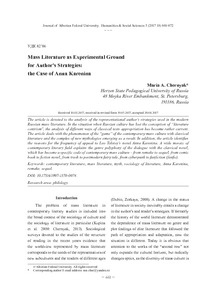Mass Literature as Experimental Ground for Author’s Strategies: the Case of Anna Karenina
Скачать файл:
URI (для ссылок/цитирований):
https://elib.sfu-kras.ru/handle/2311/32510Автор:
Chernyak, Maria A.
Черняк, М.А.
Дата:
2017-05Журнал:
Журнал Сибирского федерального университета. Гуманитарные науки. Journal of Siberian Federal University. Humanities & Social Sciences;2017 10 (5)Аннотация:
The article is devoted to the analysis of the representational author’s strategies used in the modern Russian mass literature. In the situation when Russian culture has lost the conception of “literature centrism”, the analysis of different ways of classical texts appropriation has become rather current. The article deals with the phenomenon of the “game” of the contemporary mass culture with classical literature and the complex of new mythologies emerging as a result. In addition, the article identifies the reasons for the frequency of appeal to Leo Tolstoy’s novel Anna Karenina. A wide mosaic of contemporary literary field explains the genre polyphony of the dialogue with the classical novel, which has become a specific code of contemporary mass culture – from remake to sequel, from comic book to fiction novel, from trash to postmodern fairy tale, from cyberpunk to fanfiction (fanfic) Статья посвящена анализу репрезентативных авторских стратегий, реализуемых в совре-
менной российской массовой литературе. В ситуации утраты русской культурой принципа
литературоцентризма анализ разных способов присвоения классического текста массовой
литературой приобретает особую актуальность. В статье рассматривается феномен игры
современного масскульта с классической литературой и возникающий в связи с этим ком-
плекс новых мифологий, выявляются причины частотности обращения к роману Л. Толстого
«Анна Каренина». Большая мозаика современного литературного поля объясняет жанровую
полифонию диалога с классическим романом, который стал определенным кодом современно-
го масскульта – от ремейка до сиквела, от комикса до фантастического романа, от треша до
постмодернистской сказки, от киберпанка до фанфика
Коллекции:
Метаданные:
Показать полную информациюСвязанные материалы
Показаны похожие ресурсы по названию, автору или тематике.
-
Peculiarities of Indigenous Children’s Literature
Smolina, Maia G.; Смолина, М.Г. (Сибирский федеральный университет. Siberian Federal University., 2016-09)The article deals with the specificity of addressing children, reflection of the mythology and folklore, peculiarities of creativity of indigenous literature. The review, analysis and comparison of the Khakass, Tuvinian, ... -
British Literature at the Turn of the 20th-21st Centuries in Russian Translations: Translatability and the Problem of “The Third Literature”
Dubovik, Anastasiya S.; Дубовик, А.С. (Сибирский федеральный университет. Siberian Federal University, 2018-01)The extent of the national literary system’s participation in the global translation process is one of the most important indicators of its openness. Therefore, the translation’s role of the dialogue between literatures ... -
Literature Abuse, or the Motive of the Guilt and Punishment of the Reader
Turysheva, Olga N.; Турышева, О.Н. (Сибирский федеральный университет. Siberian Federal University., 2015-06)The purpose of the present article is the analysis of a literature abusing reader image. The motive of a reader guilty of literature abuse and the nature of its functioning are studied on the basis of some works of modern ... -
The Development of Tuvan Literature During the Soviet Period (1960-80-s)
Mizhit, Liudmila S.; Мижит, Л.С. (Сибирский федеральный университет. Siberian Federal University, 2018-04)This article examines the history of Tuvan literature in the Soviet era, namely the 1960-80-s of the 20th century, when it was intensively developing within the creative dialogue of literatures and cultures of different ... -
Return of a Subject in the German Metafiction of 1960–1990
Kotelevskaya, Vera V.; Котелевская, В.В. (Сибирский федеральный университет. Siberian Federal University, 2018-07)The article examines a so-called “death of a subject” based on the German metafiction of 1960–1990. This subgenre is interpreted as the most adequate literary form of problematization of the modern subject. The protagonist ...

